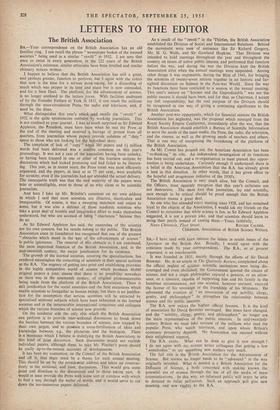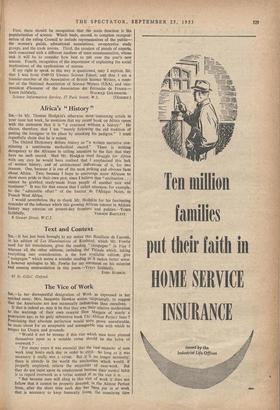have read with keen interest the letters in recent issues
of the Spectator on the British Ass. Broadly, I would agree with the criticisms made by your correspondents. The B.A., as at present organised, is an anachronism.
It was founded in 1831, mainly through the efforts of Sir David Brewster. He, in an article in The Quarterly Review, complained about the official neglect of science: scientific institutions were being dis- couraged and even abolished; the Government ignored the claims of science, and not a single philosopher enjoyed a pension, or an allow- ance, or a sinecure, capable of supporting him and his family in the humblest circumstances; not one scientist, however eminent, enjoyed the favour Of his sovereign or the friendship of his Ministers. He advocated the creation of "an association of our nobility, clergy, gentry, and philosophers " to strengthen the relationship between science and the public interests.
The B.A. now enjoys the highest official favours. It is the kind of association Sir David Brewster envisaged. But times have changed, and the " nobility, clergy, gentry, and philosophers" no longer are the main representatives of the public interests. In mid-twentieth- century Britain we must take account of the millions who read the popular Press, who watch television, and upon whom Britain's economic prosperity depends. No Association can succeed without their enlightened support. The B.A. exists. What can be done to give it new strength ? I do not agree with my science writer colleagues that getting a few " somebodies " to say something new matters very much. The full title is the British Association for the Advancement of Science. But science no longer needs to be " advanced " in the way originally intended. What is needed is•a British Association for the DiffusiOn of Science, a body concerned with making known the potential use of science through the use of all the media of mass communications. In this way, an informed public will better be able to demand its fuller utilisation. Such an approach pill give new meaning, and new vitality to the B.A.
First, there should be recognition that the main function is the popularisation of science. Which leads, second, to complete reorgani- sation of the ruling Council to include representatives of the public— the women's guilds, educational associations, co-operative study groups, and the trade unions. Third, the creation of panels of experts, each concerned with a different medium of mass communication, whose task it will be to consider how best to put over the year's new science. Fourth, recognition of the importance of explaining the social implications of the applications of science.
If my right to speak in this way is questioned, may I explain, Sir, that I was from 1949-53 Unesco Science Editor, and that I am a founder-member of the Association of British Science Writers, a mem- ber of the National Association of Science Writers (USA), and vice- president d'honneur of the Association des Ecrivains de France.— Science Information Service, 37 Park Street, W.I. (Director.)



































 Previous page
Previous page